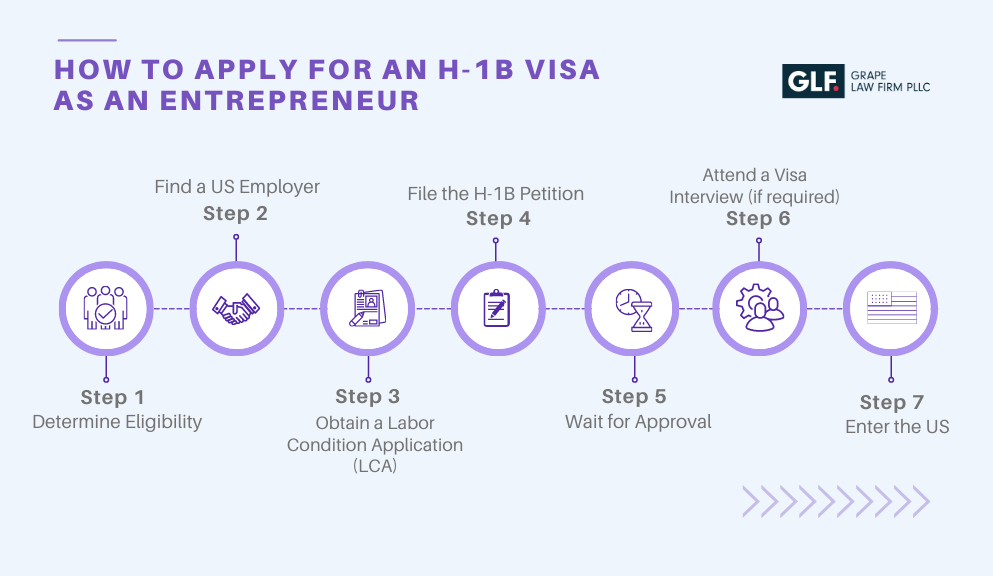The H-1B visa is a popular option for entrepreneurs looking to start a business in the United States. However, the process of obtaining an H-1B visa can be complex and time-consuming. In this article, we'll provide a step-by-step guide on how to apply for an H-1B visa as an entrepreneur. In addition, we'll explore the pros, cons, and everything in between for entrepreneurs as the H-1B visa has become a popular option for entrepreneurs looking to start a business in the United States. This non-immigrant visa category allows US employers to hire foreign workers in specialty occupations, including entrepreneurs with unique skills and qualifications.

Step 1: Determine Eligibility
The first step in applying for an H-1B visa is to determine if you're eligible. To be eligible, you must have a bachelor's degree or higher in a specialty occupation, and the job you're applying for must require a bachelor's degree or higher. Additionally, your employer (yourself, as the entrepreneur) must be willing to sponsor you for an H-1B visa. Since an H-1B visa requires a sponsor for the application, whether an entrepreneur can sponsor for themselves is a crucial question.
Can you apply for an H-1B if you are self-employed?
Yes, if you own a company, it is possible to apply for an H-1B visa if you can demonstrate that there is an employer-employee relationship between the company and yourself, as the employee. This can be demonstrated if the control of your work is exercised by someone other than yourself, such as investors, a board of directors, preferred shareholders, etc.
However, it's important to note that demonstrating these employer-employee relationships can be challenging and require evidence to support it. It's recommended to consult with an immigration attorney to determine the best approach and ensure a successful H-1B visa application.
How could you prove an employer-employee relationship if you own the company?
If you own your own company and wish to apply for an H-1B visa, you need to demonstrate that there is an employer-employee relationship between you and the company. The following evidence can help establish this relationship:
Organizational charts:
Showing that the company has a structure and hierarchy and demonstrating the position of the employee (you) within the organization.
Job description:
Detailing the duties and responsibilities of the employee and the level of control that the company exercises over the employee's work.
Payroll records:
Showing that the employee (you) is paid by the company and that the company has the right to control the employee's work.
Contracts:
Such as employment contracts or service contracts, between the company and the employee, specifying the terms and conditions of the employment relationship.
Tax forms:
Such as W-2 forms or 1099 forms demonstrate the employer-employee relationship and the compensation received by the employee.
Performance reviews:
Demonstrating that the company evaluates the employee's performance and has the right to control the employee's work.
These are some examples of evidence that can be used to demonstrate the employer-employee relationship. Still, each case is unique and the specific evidence required will depend on the circumstances. It's recommended to consult with an immigration attorney for personalized guidance and to ensure that your H-1B visa application is as strong as possible.
Step 2: Find a US Employer
As an entrepreneur, you will be the sponsor of your own H-1B visa. This means that you'll need to set up a US-based business and be the employer of record for the H-1B visa.
Step 3: Obtain a Labor Condition Application (LCA)
The next step is to obtain a Labor Condition Application (LCA) from the Department of Labor (DOL). The LCA confirms that the terms and conditions of your employment are consistent with the conditions in the area of intended employment and that the hiring of a foreign worker will not negatively impact the wages and working conditions of similarly employed U.S. workers.
Step 4: File the H-1B Petition
Once you have the LCA, you can file the H-1B petition with U.S. Citizenship and Immigration Services (USCIS). The petition must include the following documents:
- Form I-129, Petition for Nonimmigrant Worker
- Labor Condition Application (LCA)
- Proof of a bachelor's degree or higher required for the job
- Evidence of your ability to perform the duties of the job
- Proof of the employer-employee relationship between the entrepreneur and the business
- Evidence of the financial ability of the business to pay the prevailing wage for the position
Step 5: Wait for Approval
Once the H-1B petition is filed, you'll need to wait for approval from USCIS. The processing time for H-1B visas can vary, so it's important to plan accordingly.
Step 6: Attend a Visa Interview (if required)
In some cases, you may be required to attend a visa interview at a US embassy or consulate. During the interview, a consular officer will review your H-1B petition and ask questions to confirm your eligibility.
Step 7: Enter the US
Once your H-1B visa is approved, you can enter the United States and start your business. You'll be allowed to stay in the US for up to three years, with the possibility of renewing the visa for an additional three years.
H-1B Visa for Entrepreneurs: The Pros, Cons, and Everything In-Between
Pros
Access to the US Market:
The US is home to one of the world's largest and most dynamic markets. With an H-1B visa, entrepreneurs have the opportunity to access this market and grow their businesses.
The attraction of Talent:
The H-1B visa can also be a valuable tool for attracting top talent from around the world. This is especially important for entrepreneurs who need to build a team in order to grow their businesses.
Path to Permanent Residence:
For entrepreneurs who eventually want to become permanent residents of the US, the H-1B visa can be a valuable stepping stone. An entrepreneur with a successful H-1B-based business may be eligible for an EB-1C visa, which is a fast track to permanent residency.
Cons
High Demand:
The demand for H-1B visas is extremely high, and the number of visas available each year is limited. This means that the process of obtaining an H-1B visa can be competitive and time-consuming.
Costly and Complex Process:
The process of obtaining an H-1B visa is also costly and complex. Entrepreneurs must navigate a maze of regulations and requirements and may need to work with immigration lawyers and other professionals to ensure their applications are complete and accurate.
Uncertainty:
The H-1B visa is a non-immigrant visa, which means it's only valid for a specific period of time. This can create uncertainty for entrepreneurs who want to establish their businesses in the US, as they may need to renew their visas or find other options in order to remain in the country.
Limited Time for Business Development:
The H-1B visa is subject to strict time limits, which can limit the amount of time entrepreneurs have to develop their businesses. In some cases, entrepreneurs may need to return to their home countries after their visas expire, disrupting their businesses and creating additional costs.
In conclusion, the H-1B visa is a valuable option for entrepreneurs looking to start a business in the US. However, it's important to carefully weigh the pros and cons before making a decision. Entrepreneurs should consider the high demand for H-1B visas, the cost and complexity of the process, the uncertainty of the visa status, and the limited time available for business development. With the right planning and support, the H-1B visa can provide entrepreneurs with the opportunity to access the US market, attract top talent, and potentially pave the way for permanent residency.
Expert Assistance from Grape Law Firm
At Grape Law Firm, our immigration attorneys understand the importance of securing an H-1B visa for entrepreneurs who own their own companies. Our team of experienced lawyers will guide you through the complex process of demonstrating an employer-employee relationship and help you prepare a strong H-1B visa application. From collecting and organizing the necessary documentation to representing you in front of immigration officials, we will be there for you every step of the way. Our goal is to help you achieve your dream of working and doing business in the United States. Contact Grape Law Firm today to schedule a consultation and let us help you navigate the H-1B visa process.
